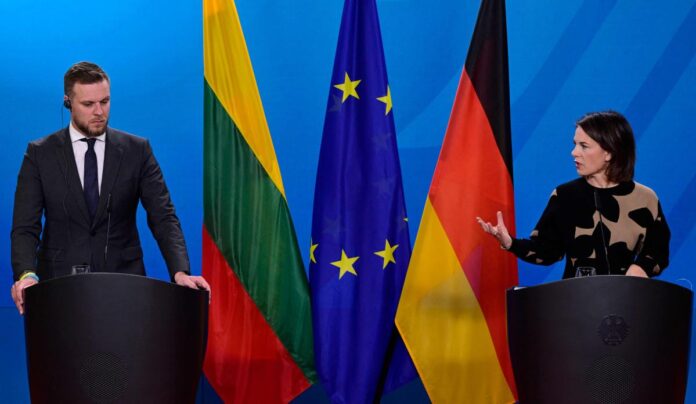BERLIN: EU foreign ministers will Monday discuss slapping Iran with new sanctions over its deadly crackdown on protests and support for Russia in Ukraine, member state Lithuania said.”We will be suggesting additional (Iranian) listings that could be added… to the sanctions list,” said Lithuanian Foreign Minister Gabrielius Landsbergis on Friday during a visit to Berlin.”It would have two parts — for Iranian participation in the war on Russia’s side in Ukraine, but also for the human rights abuses that are happening in the cities of Iran.”A senior EU official, speaking anonymously, said foreign ministers would likely adopt sanctions at the Brussels meeting on Monday over the repression of protests triggered by the death of Mahsa Amini.She died in the custody of the morality police on September 16, three days after falling into a coma following her arrest in Tehran for allegedly breaching the Islamic republic’s hijab dress rules for women.A European diplomat, speaking on condition of anonymity, said that about 30 names were set to be added to the sanctions list.The EU had already imposed sanctions against Iran on October 17, targeting the morality police and 11 officials including the country’s telecommunications minister over alleged involvement in repressing the protests.Transfers of drones from Iran to Russia would also be discussed, said the EU official.Kyiv and its Western allies have accused Russia of using Iranian-made drones in recent weeks to carry out attacks in Ukraine.Last weekend, Iran admitted for the first time that it sent drones to Russia but insisted they were supplied to its ally before Moscow invaded Ukraine.The EU is also seeking to confirm reports that Iran had transferred missiles to Russia to be used in Ukraine, the official said.”If that is proven to be true… we will take action in the form of sanctions,” the official said.Iran has denied supplying missiles to Russia, calling the accusations “completely false.”German Foreign Minister Annalena Baerbock had already indicated earlier this week the 27-member EU was poised to adopt new sanctions, prompting Tehran to accuse Germany of being “provocative” and “undiplomatic.”After talks with her Lithuanian counterpart, Baerbock pushed back, saying that “it is our European understanding that observance of universal human rights is not a national matter, but a universal matter.”

